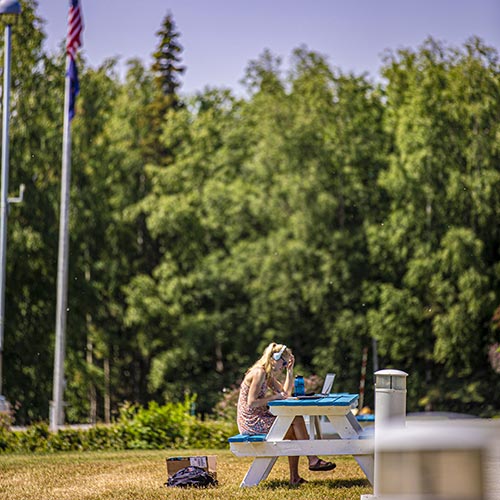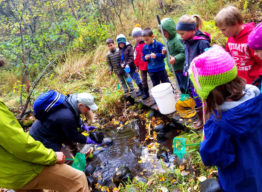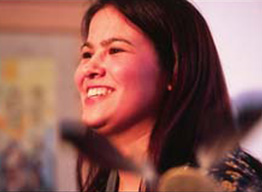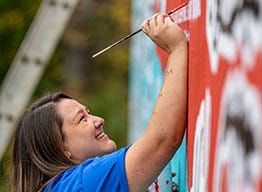Overview
The purpose of the MFA program is to provide an engaging, rigorous, and culturally responsive learning environment for emerging writers and to showcase and support the work of Alaskan, Indigenous, and Northern writers. The low-residency MFA is a 36-credit program combining intensive, individualized study with on-campus summer residencies. Summer residencies—approximately 2 weeks in length, and introduced by online learning sessions—are comprised of workshops, seminars, lectures, panels, and readings. In summer residencies, students engage in the process of giving and receiving constructive feedback, all while nurturing an artistic intuition to guide them on the right track beyond their studies. Fall and Spring semesters in the program involve one-on-one, mentor-directed study plans, advancing individual writing goals. As they work through individualized study plans, students hone their craft with the goal of producing publishable works.
Over the course of two years and three summers, students gain a comprehensive understanding of their chosen genre (fiction, literary nonfiction, poetry) along with their place among the notable writers who have gone before them. Through residencies on APU’s campus, the program strives to honor the Dena’ina people and their traditional lands upon which APU sits, as well as Alaska Native storytelling traditions that have thrived and continue to inspire.
Application Deadline: Tuesday, April 1, 2025
Degree Fit
The Master of Fine Arts is a 36-credit program of individualized, mentor-directed studies with three summer terms, each inclusive of a low-residency requirement. The program includes three areas of study: Fiction, Literary Nonfiction, and Poetry.
Over the course of two years and three summers, students gain a comprehensive understanding of their chosen genre (fiction, literary nonfiction, poetry) along with their place among the notable writers who have gone before them. Fall and Spring semesters in the program involve one-on-one, mentor-directed study plans, advancing individual writing goals. As they work through individualized study plans, students hone their craft with the goal of producing publishable works.
Summer residencies—approximately 2 weeks in length, and introduced by online learning sessions—are comprised of workshops, seminars, lectures, panels, and readings. Through residencies on APU’s campus, the program strives to honor the Dena’ina people and their traditional lands upon which APU sits, as well as Alaska Native storytelling traditions that have thrived and continue to inspire.
The academic year for the Low-Residency MFA begins every Summer Session. Incoming students enroll in 5 credits of Graduate Writer’s Workshop in their genre and begin pre-residency online instruction in May, in preparation for the on-campus residency in July.
Summer Session Online Schedule Framework: Mon., May 5 – Fri., July 11, 2025
Summer On-Campus Residency Schedule Framework: Sat., July 12 – Wed., July 23, 2025
Summer Residency, July 2024 Master Schedule
APU Summer Reading Series 2024

https://www.creativewritingedu.org/
The cost per credit hour for graduate programs is $848 per credit hour. Mandatory fees are $410/year.
For more information, please visit: https://www.alaskapacific.edu/admissions/costs/
Faculty
Career Outcomes

- Doctorate Program
- Writing Instructor
- Freelance Writer and/or Editor
Degree Roadmap
Year 1
|
COURSE |
CREDIT HOURS |
|
CRWR 60100-60300: Graduate Writer’s Workshop |
5 |
|
CRWR 60500: Form & Theory: Fall Mentorship |
5 |
|
CRWR 60500: Form & Theory: Spring Mentorship |
5 |
Year 2
|
COURSE |
CREDIT HOURS |
|
CRWR 60100-60300: Graduate Writer’s Workshop: Summer Residency II |
5 |
|
CRWR 60500: Form & Theory: Fall Mentorship |
5 |
|
CRWR 69900: Thesis |
5 |
Year 3
|
COURSE |
CREDIT HOURS |
|
CRWR 69900 Thesis |
3 |
|
CRWR 60400 Thesis Writer’s Workshop Summer Residency 3 |
3 |
CRWR 60100 – Graduate Writer’s Workshop – Fiction
As a hybrid course for MFA students with a focus on Fiction, the Graduate Writer’s Workshop will begin with weekly online meetings at the start of the summer session and culminate in a 12-day Summer Residency on campus. Online, students will gather with their Fiction peers and submit short creative works in response to writing prompts, and analyze the assigned readings in group discussions. At the residency, students will attend daily workshops in their genre, as well as lectures, seminars, and panels given by faculty mentors across genres. A typical day of instruction ends with a reading given by the faculty, open to the community. Over the course of this residency period, students are required to attend all sessions. In-person participation at the residency is mandatory; students cannot complete this requirement online or by independent study.
Prerequisite: Admission into the MFA Program
Offered: Annually
CRWR 60200 – Graduate Writer’s Workshop – Literary Nonfiction
As a hybrid course for MFA students with a focus on Nonfiction, the Graduate Writer’s Workshop will begin with weekly online meetings at the start of the summer session and culminate in a 12-day Summer Residency on campus. Online, students will gather with their Nonfiction peers and submit short creative works in response to writing prompts, and analyze the assigned readings in group discussions. At the residency, students will attend daily workshops in their genre, as well as lectures, seminars, and panels given by faculty mentors across genres. A typical day of instruction ends with a reading given by the faculty, open to the community. Over the course of this residency period, students are required to attend all sessions. In-person participation at the residency is mandatory; students cannot complete this requirement online or by independent study.
Prerequisite: Admission into the MFA Program
Offered: Annually
CRWR 60300 – Graduate Writer’s Workshop – Poetry
As a hybrid course for MFA students with a focus on Poetry, the Graduate Writer’s Workshop will begin with weekly online meetings at the start of the summer session and culminate in a 12-day Summer Residency on campus. Online, students will gather with their Poetry peers and submit short creative works in response to writing prompts, and analyze the assigned readings in group discussions. At the residency, students will attend daily workshops in their genre, as well as lectures, seminars, and panels given by faculty mentors across genres. A typical day of instruction ends with a reading given by the faculty, open to the community. Over the course of this residency period, students are required to attend all sessions. In-person participation at the residency is mandatory; students cannot complete this requirement online or by independent study.
Prerequisite: Admission into the MFA Program
Offered: Annually
CRWR 60500 – Form and Theory
In contact with their faculty mentor throughout the semester, students will submit new creative work and revise previously submitted work in consideration of faculty feedback. The form of this creative work should be directed by observations of the theory informing the elements of craft in published works of interest. With this in mind, students will conduct a critical analysis of each of the full-length works on their reading list, decided upon in discussion with their mentor prior to the start of the semester. Students will complete an annotation for each of these works, to be compiled later in the annotated bibliography segment of the thesis.
Prerequisite: CRWR 60100-60300, Graduate Writer’s Workshop
CRWR 69900 – Thesis
Students will work one-on-one with their mentors near the end of their studies in the program for the express purpose of completing their thesis. A completed thesis is composed of three parts: creative work (100 to 200 pages for fiction or literary nonfiction, and 48 to 64 pages of poetry); a research-focused craft essay (20-40 pages); annotated bibliography (between 40 and 70 books). Students will enroll in thesis credits for the spring semester prior to their third and final summer residency. In the summer session of this final residency, students will not join their peers for the online instruction period beforehand; instead, they will enroll in 3 more thesis credits and remain focused on completing their thesis under the guidance of their mentors. During this final residency, students will not participate in the daily morning workshop sessions and may use this time to prepare an overview of their work and research in completing the thesis, culminating in a colloquium presentation at the end of the residency, which will take the place of a thesis defense.
Prerequisite: CRWR 60500 – Form and Theory
Offered: Spring, Annually
CRWR 60400 – Thesis Writer’s Workshop
During the final summer term, thesis students are required to take Thesis Writer’s Workshop inclusive of the residency requirement. In this course, thesis students participate only in the residency (not the online sessions included for other Writer’s Workshops). At the residency, thesis students do not participate in the daily morning workshop sessions, but do participate in other residency activities. A requirement of the thesis residency is a culminating colloquium presentation scheduled during the residency. In the colloquium, which takes the place of a thesis defense, thesis students are required to present the main attributes of their creative work as well as the research that comprises the craft essay. Prerequisite: 10 credits of Writer’s Workshop in the student’s chosen genre (2 summer residencies).
Offered: Annually
Similar Programs
 Teacher Education K-8 Certificate
Teacher Education K-8 Certificate
Graduate Certificate
 Alaska Native Governance
Alaska Native Governance
Bachelor of Arts
 Creative & Professional Writing
Creative & Professional Writing
Bachelor of Arts
 Master of Arts Program
Master of Arts Program
Master of Arts


 Chaun Ballard
Chaun Ballard Corinna Cook
Corinna Cook Jamey Bradbury
Jamey Bradbury
